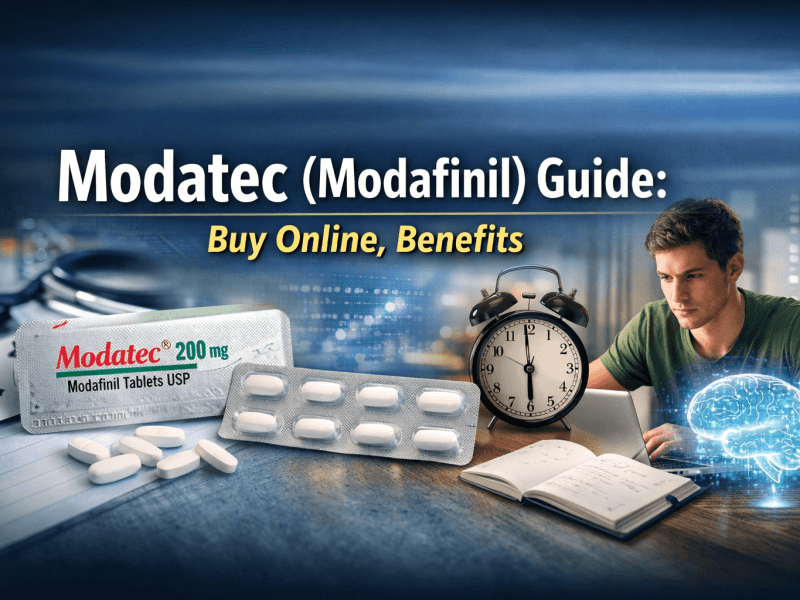Last Updated on 01/10/2025 by James Anderson
Introduction
In today’s fast-paced world, people are constantly looking for ways to boost their cognitive performance, whether for work, study, or general productivity. Modafinil, often referred to as a “smart drug” or nootropic, has become one of the most popular solutions for individuals seeking enhanced alertness and mental clarity. But what about insurance? Does your health plan cover this increasingly popular drug? What you need to know about modafinil, its cost, insurance and the best alternatives.
What is Modafinil?
Definition and Purpose
Modafinil is a prescription medication primarily used to treat sleep disorders like narcolepsy, obstructive sleep apnea, and shift work sleep disorder. It is known for its ability to promote wakefulness and improve focus and cognitive function, which is why it’s also used off-label by people looking to enhance their mental performance.
Medical Uses and Benefits
Modafinil works by affecting certain chemicals in the brain that control wakefulness. It’s highly effective for those with excessive daytime sleepiness or fatigue caused by sleep disorders. Aside from its medical use, many individuals without sleep disorders use Modafinil to increase concentration, enhance memory, and boost cognitive performance.
Commonly Prescribed Conditions
Some of the conditions Modafinil is prescribed for include:
- Narcolepsy: A chronic sleep disorder that causes excessive daytime sleepiness.
- Sleep Apnea: A condition where breathing repeatedly stops during sleep.
- Shift Work Sleep Disorder: A condition affecting people who work non-traditional hours and experience disrupted sleep patterns.
Insurance and Modafinil Coverage
Does Insurance Cover Modafinil?
In short, insurance coverage for Modafinil can vary. Many health insurance plans do cover the drug when it’s prescribed for one of the FDA-approved conditions. However, it’s not guaranteed for off-label uses, like cognitive enhancement.
Factors Influencing Insurance Coverage
Several factors can determine whether Modafinil is covered by your insurance plan:
- Your medical condition: If Modafinil is prescribed for a recognized medical condition (e.g., narcolepsy), it is more likely to be covered.
- Insurance plan type: Some insurance plans offer more extensive coverage for prescription medications, while others might have restrictions.
- Form of Modafinil: Generic versions of Modafinil are often cheaper and might have a higher chance of being covered compared to the brand-name version.
Types of Insurance Plans That May Cover Modafinil
- Employer-Sponsored Insurance: If you have insurance through your job, it’s worth checking with your provider. These plans may cover Modafinil for medical use.
- Medicare/Medicaid: For those eligible, Medicare may cover Modafinil, especially if prescribed for a qualifying condition.
- Private Health Insurance: Many private health plans will cover Modafinil, but coverage details vary.
The Cost of Modafinil
Average Cost of Modafinil Without Insurance
Without insurance, Modafinil can be quite expensive. The cost can range anywhere from $300 to $600 for a 30-day supply, depending on whether you’re purchasing the brand-name version (Provigil) or a generic alternative.
Price Differences Depending on the Form (Brand vs Generic)
- Brand-name Modafinil: The branded version, Provigil, is significantly more expensive, often costing several hundred dollars for a one-month supply.
- Generic Modafinil: Generic versions of Modafinil (sold under names like ModaXL or Modalert) tend to be much cheaper, often ranging between $50 and $100 for a 30-day supply.
Cost Breakdown with Insurance
When covered by insurance, your out-of-pocket cost will likely depend on your copay and deductible. For individuals with good insurance coverage, the cost could be as low as $20 to $50 for a 30-day supply.
How to Get Modafinil Through Insurance
Steps to Take When Applying for Modafinil with Insurance
- Get a prescription: Your doctor must prescribe Modafinil for a covered condition.
- Submit the prescription: Provide your insurance company with the necessary documentation from your healthcare provider.
- Check for pre-authorization: Some insurance plans require pre-authorization before covering a medication like Modafinil. This process may involve submitting additional paperwork.
What to Expect During the Approval Process
The approval process for Modafinil can take a few days to weeks. Your insurance company may require additional forms or a letter of medical necessity from your doctor. Be patient, as the paperwork and communication with your insurance provider can take time.
Common Issues and How to Address Them
If your insurance doesn’t approve Modafinil, you can appeal the decision or consider alternative medications. Be proactive in seeking alternatives if Modafinil is not covered for your condition.
Alternatives to Modafinil
Overview of Other Cognitive Enhancers
There are several alternatives to Modafinil that can enhance cognitive function:
- Adderall: Often prescribed for ADHD, Adderall increases focus and alertness but can come with more side effects.
- Ritalin: Another stimulant, Ritalin is used to treat ADHD but may have similar side effects to Adderall.
- L-Theanine: A natural supplement that can help with relaxation and focus without the jitteriness of stimulants.
Natural Alternatives to Modafinil
If you prefer natural alternatives, consider:
- Caffeine: A well-known cognitive enhancer, caffeine can boost alertness and focus.
- Ginseng: An herb used for its potential to increase energy and mental clarity.
- Rhodiola Rosea: Known for its adaptogenic properties, it helps the body handle stress and improves mental performance.
Prescription Alternatives and Their Efficacy
Prescription alternatives like Adderall and Ritalin can work similarly to Modafinil but often come with greater risk for dependency and side effects. Modafinil, on the other hand, is less likely to be habit-forming.
Comparing Modafinil and Its Alternatives
Effectiveness of Modafinil vs Alternatives
While Modafinil is generally well-tolerated and highly effective for improving cognitive performance, other alternatives like Adderall and Ritalin may provide similar benefits for individuals with ADHD, but they come with a higher risk of side effects.
Side Effects Comparison
Modafinil is known for having fewer side effects compared to prescription stimulants like Adderall. However, potential side effects include headaches, dizziness, or gastrointestinal issues. Alternatives like caffeine can cause jitteriness or anxiety.
Cost vs Benefit Analysis
When comparing Modafinil to other alternatives, the cost is a crucial factor. While Modafinil is expensive without insurance, it may be cheaper than other prescription options when covered by insurance.
How to Make the Best Decision for Your Health
Consulting a Healthcare Professional
Before choosing Modafinil or any alternative, it’s essential to consult your doctor to determine the most suitable option for your specific needs. A medical professional can evaluate your health history, current medications, and potential risks to ensure you’re making a safe and effective choice.
Considering the Long-Term Impact
While Modafinil can be beneficial in the short term, it’s important to think about its long-term effects. Continuous reliance on any cognitive enhancer may have consequences, such as tolerance build-up, possible side effects, or masking underlying health issues like poor sleep hygiene.
Understanding Risks and Benefits
The key is balance. Modafinil offers benefits like improved alertness and productivity, but it also comes with potential downsides, including headaches, anxiety, and insomnia. Weigh these against your personal goals and health needs before making a decision.
Conclusion
Modafinil can be a game-changer for people dealing with sleep disorders or those who need an extra mental boost. However, whether it’s covered by insurance depends on your medical condition, policy details, and the form of the drug (brand or generic). Without insurance, it can be costly, but cheaper alternatives both prescription and natural do exist.
The smartest move? Work closely with your doctor, explore all your options, and weigh the pros and cons before making a commitment. Whether you stick with Modafinil or opt for an alternative, the goal is to support your health and cognitive performance without unnecessary risks.
FAQ
1. Is Modafinil covered by all insurance plans?
No, coverage varies depending on your insurance provider, policy, and the condition for which Modafinil is prescribed.
2. Can I buy Modafinil without a prescription?
In most countries, including the US, Modafinil is a prescription-only medication.
3. What are the most common side effects of Modafinil?
Common side effects include headaches, nausea, dizziness, and trouble sleeping.
4. Are there any natural alternatives to Modafinil that work?
Yes, options like caffeine, L-theanine, ginseng, and Rhodiola Rosea can help improve focus and alertness.
5. How can I lower the cost of Modafinil?
Consider using generic versions, pharmacy discount programs, or checking if your insurance covers it for your specific condition.
‼️ Disclaimer: The information provided in this article about modafinil is intended for informational purposes only and is not a substitute for professional medical consultation or recommendations. The author of the article are not responsible for any errors, omissions, or actions based on the information provided.
References:
- U.S. Food and Drug Administration. PROVIGIL. U.S. Department of Health and Human Services. https://www.accessdata.fda.gov/drugsatfda_docs/label/2015/020717s037s038lbl.pdf . 2015
- Ballon JS, Feifel D. A systematic review of modafinil: potential clinical uses and mechanisms of action. J Clin Psychiatry. 2006
- Willavize, S. A., Nichols, A. I., & Lee, J. Population pharmacokinetic modeling of armodafinil and its major metabolites. https://doi.org/10.1002/jcph.800 . 2016
- Becker, P. M., Schwartz, J. R., Feldman, N. T., & Hughes, R. J. Effect of modafinil on fatigue, mood, and health-related quality of life in patients with narcolepsy. https://doi.org/10.1007/s00213-003-1508-9 . 2004
- Wirz, S., Nadstawek, J., Kühn, K. U., Vater, S., Junker, U., & Wartenberg, H. C. Modafinil zur Behandlung der Tumorfatigue: Eine Interventionsstudie [Modafinil for the treatment of cancer-related fatigue: An intervention study]. https://doi.org/10.1007/s00482-010-0987-y . 2010
- Woo, J., & Verduzco-Gutierrez, M. Traumatic brain injury: An overview of epidemiology, pathophysiology, and medical management. Medical Clinics of North America. https://doi.org/10.1016/j.mcna.2019.11.001 . 2020
- Oliva Ramirez A, Keenan A, Kalau O, Worthington E, Cohen L, Singh S. Prevalence and burden of multiple sclerosis-related fatigue: a systematic literature review. https://doi.org/10.1186/s12883-021-02396-1 . 2021.
- Ciancio A, Moretti MC, Natale A, Rodolico A, Signorelli MS, Petralia A. Personality Traits and Fatigue in Multiple Sclerosis: A Narrative Review. Journal of Clinical Medicine. https://doi.org/10.3390/jcm12134518 . 2023
- Mereu, M., Bonci, A., Newman, A. H., & Tanda, G. The neurobiology of modafinil as an enhancer of cognitive performance and a potential treatment for substance use disorders. https://doi.org/10.1007/s00213-013-3232-4 . 2013
- Greenblatt, K., & Adams, N. Modafinil. StatPearls Publishing. https://www.ncbi.nlm.nih.gov/books/NBK531476/ . 2023


